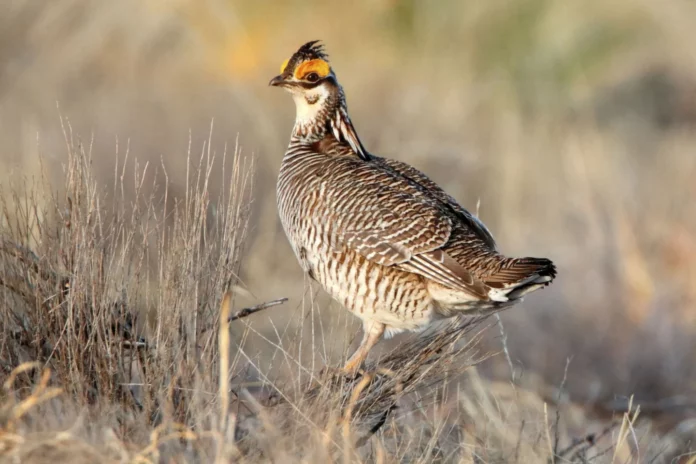
Congress has approved two measures to undo federal protections for the lesser prairie chicken and northern long-eared bat — two endangered animals that have seen their populations plummet over the years.
In separate votes Thursday, the House gave final legislative approval to rescind protections for the lesser prairie chicken — a rare prairie bird once thought to number in the millions, but now hover around 30,000, officials said — and the long-eared bat, one of 12 bat types decimated by a fungal disease called white-nose syndrome.
The legislative actions, backed mostly by Republicans, represent rare congressional involvement in matters usually left to the U.S. Fish and Wildlife Service and the National Marine Fisheries Service. The Endangered Species Act tasks the agencies with deciding which animals and plants to list as endangered or threatened and how to rebuild their populations.
The lesser prairie chicken, which belongs to the grouse family, is found in parts of the Midwest and Southwest, including one of the country’s most prolific oil and gas fields — the oil-rich Permian Basin in New Mexico and Texas. The bird’s range also extends into parts of Colorado, Oklahoma, and Kansas, but has diminished across about 90% of its historical range, officials said.
The House voted 221-206 to reverse protections for the prairie bird.
A separate 220-209 vote would overturn protections for the northern long-eared bat, which has seen its population reduced by 97% or more in some areas because of white-nose syndrome. The bat is found in 37 eastern and north-central states, plus Washington, D.C., and much of Canada.
The House votes follow similar action in the Senate in May and send both plans to President Joe Biden, who has threatened to veto both resolutions.
Overturning protections for the lesser prairie chicken “would undermine America’s proud wildlife conservation traditions, risk the extinction of a once-abundant American bird, and create uncertainty for landowners and industries who have been working for years to forge the durable, locally-led conservation strategies that this rule supports,” the White House said in a statement.
In a separate statement, the White House said bats are “critical to healthy, functioning ecosystems and contribute at least $3 billion annually to the U.S. agriculture economy through pest control and pollination.’’ Overturning protections “would risk extinction of a species.”
Environmentalists have long sought stronger federal protections for the prairie bird, which they consider severely at risk due to oil and gas development, livestock grazing, and farming, along with roads and power lines.
The crow-size, terrestrial birds are known for spring courtship rituals that include flamboyant dances by the males as they make a cacophony of clucking, cackling, and booming sounds.
White-nose syndrome, meanwhile, has spread across about 80% of the northern bat’s range and caused a precipitous decline in bat populations. Critics of the endangered listing contend it would hamper logging and other land uses that aren’t responsible for the bat’s sharp decline.
Rep. Bruce Westerman, an Arkansas Republican who chairs the House Natural Resources Committee, called the Endangered Species Act an important but outdated part of U.S. history.
“The unavoidable truth about the ESA is that a listing means less private investment, which harms conservation efforts,’’ he said.
In the case of the lesser prairie chicken, the protected status “is a tool for Fish and Wildlife to go implement the Biden administration’s none-of-the- above energy policy,’’ Westerman said on the House floor. “It’s another attack on low-cost energy for the American taxpayers. It’s an attack on jobs in America and it’s making us more dependent’’ on hostile countries in the Middle East and South America, he said.
Arizona Rep. Raul Grijalva, the top Democrat on the natural resources panel, said the GOP measures “give industry and not science the upper hand in making decisions about endangered species.’’
He labeled Republican opposition to the Endangered Species Act “a vendetta.” He also said the two votes on Thursday were egregious since the GOP-controlled House has not taken action to address climate change, even as Arizona and other states suffer through “one of the most brutal summers in this country’s recorded history.’’
Climate change “isn’t about some distant warning about melting icecaps in the far-off future. The climate crisis is here, it is now,’’ Grijalva said, noting that Phoenix has set a record with a 27-day streak of temperatures over 110 degree Fahrenheit.
“People are suffering. People are dying, and the GOP isn’t doing a thing about it,’’ he said.
The Republican majority “has had zero hearings on climate change’’ since taking over in January and has ”introduced zero bills to seriously address climate change,’’ Grijalva said.
The House votes follow actions by Congress earlier this year to block a clean water rule imposed by the Environmental Protection Agency and a separate Labor Department measure that allows retirement plan managers to consider the effects of climate change in their investment plans. Biden vetoed both legislative measures.
Republished with the permission of The Associated Press.













